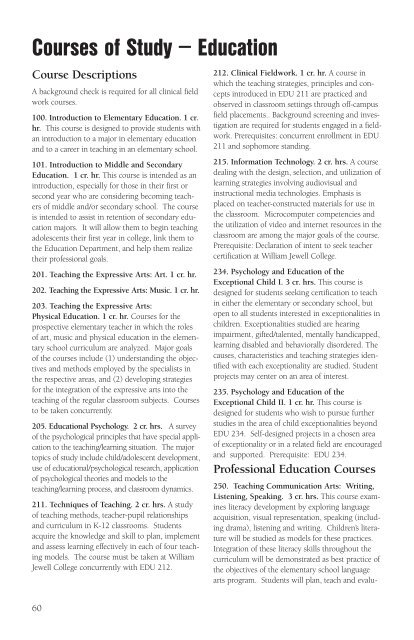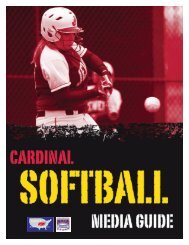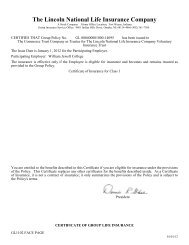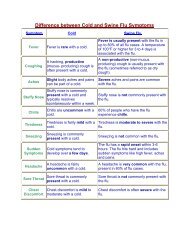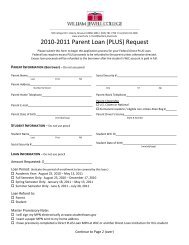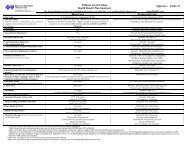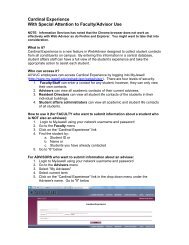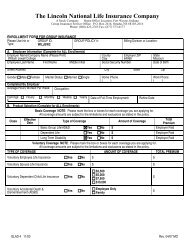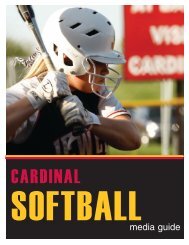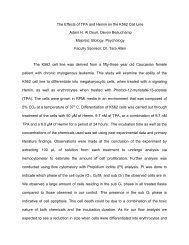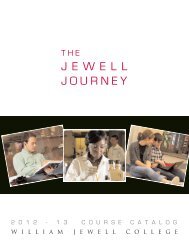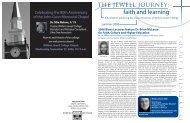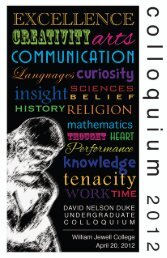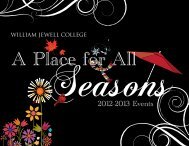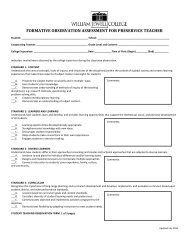Courses of Study - William Jewell College
Courses of Study - William Jewell College
Courses of Study - William Jewell College
Create successful ePaper yourself
Turn your PDF publications into a flip-book with our unique Google optimized e-Paper software.
<strong>Courses</strong> <strong>of</strong> <strong>Study</strong> – Education<br />
Course Descriptions<br />
A background check is required for all clinical field<br />
work courses.<br />
100. Introduction to Elementary Education. 1 cr.<br />
hr. This course is designed to provide students with<br />
an introduction to a major in elementary education<br />
and to a career in teaching in an elementary school.<br />
101. Introduction to Middle and Secondary<br />
Education. 1 cr. hr. This course is intended as an<br />
introduction, especially for those in their first or<br />
second year who are considering becoming teachers<br />
<strong>of</strong> middle and/or secondary school. The course<br />
is intended to assist in retention <strong>of</strong> secondary education<br />
majors. It will allow them to begin teaching<br />
adolescents their first year in college, link them to<br />
the Education Department, and help them realize<br />
their pr<strong>of</strong>essional goals.<br />
201. Teaching the Expressive Arts: Art. 1 cr. hr.<br />
202. Teaching the Expressive Arts: Music. 1 cr. hr.<br />
203. Teaching the Expressive Arts:<br />
Physical Education. 1 cr. hr. <strong>Courses</strong> for the<br />
prospective elementary teacher in which the roles<br />
<strong>of</strong> art, music and physical education in the elementary<br />
school curriculum are analyzed. Major goals<br />
<strong>of</strong> the courses include (1) understanding the objectives<br />
and methods employed by the specialists in<br />
the respective areas, and (2) developing strategies<br />
for the integration <strong>of</strong> the expressive arts into the<br />
teaching <strong>of</strong> the regular classroom subjects. <strong>Courses</strong><br />
to be taken concurrently.<br />
205. Educational Psychology. 2 cr. hrs. A survey<br />
<strong>of</strong> the psychological principles that have special application<br />
to the teaching/learning situation. The major<br />
topics <strong>of</strong> study include child/adolescent development,<br />
use <strong>of</strong> educational/psychological research, application<br />
<strong>of</strong> psychological theories and models to the<br />
teaching/learning process, and classroom dynamics.<br />
211. Techniques <strong>of</strong> Teaching. 2 cr. hrs. A study<br />
<strong>of</strong> teaching methods, teacher-pupil relationships<br />
and curriculum in K-12 classrooms. Students<br />
acquire the knowledge and skill to plan, implement<br />
and assess learning effectively in each <strong>of</strong> four teaching<br />
models. The course must be taken at <strong>William</strong><br />
<strong>Jewell</strong> <strong>College</strong> concurrently with EDU 212.<br />
212. Clinical Fieldwork. 1 cr. hr. A course in<br />
which the teaching strategies, principles and concepts<br />
introduced in EDU 211 are practiced and<br />
observed in classroom settings through <strong>of</strong>f-campus<br />
field placements.. Background screening and investigation<br />
are required for students engaged in a fieldwork.<br />
Prerequisites: concurrent enrollment in EDU<br />
211 and sophomore standing.<br />
215. Information Technology. 2 cr. hrs. A course<br />
dealing with the design, selection, and utilization <strong>of</strong><br />
learning strategies involving audiovisual and<br />
instructional media technologies. Emphasis is<br />
placed on teacher-constructed materials for use in<br />
the classroom. Microcomputer competencies and<br />
the utilization <strong>of</strong> video and internet resources in the<br />
classroom are among the major goals <strong>of</strong> the course.<br />
Prerequisite: Declaration <strong>of</strong> intent to seek teacher<br />
certification at <strong>William</strong> <strong>Jewell</strong> <strong>College</strong>.<br />
234. Psychology and Education <strong>of</strong> the<br />
Exceptional Child I. 3 cr. hrs. This course is<br />
designed for students seeking certification to teach<br />
in either the elementary or secondary school, but<br />
open to all students interested in exceptionalities in<br />
children. Exceptionalities studied are hearing<br />
impairment, gifted/talented, mentally handicapped,<br />
learning disabled and behaviorally disordered. The<br />
causes, characteristics and teaching strategies identified<br />
with each exceptionality are studied. Student<br />
projects may center on an area <strong>of</strong> interest.<br />
235. Psychology and Education <strong>of</strong> the<br />
Exceptional Child II. 1 cr. hr. This course is<br />
designed for students who wish to pursue further<br />
studies in the area <strong>of</strong> child exceptionalities beyond<br />
EDU 234. Self-designed projects in a chosen area<br />
<strong>of</strong> exceptionality or in a related field are encouraged<br />
and supported. Prerequisite: EDU 234.<br />
Pr<strong>of</strong>essional Education <strong>Courses</strong><br />
250. Teaching Communication Arts: Writing,<br />
Listening, Speaking. 3 cr. hrs. This course examines<br />
literacy development by exploring language<br />
acquisition, visual representation, speaking (including<br />
drama), listening and writing. Children’s literature<br />
will be studied as models for these practices.<br />
Integration <strong>of</strong> these literacy skills throughout the<br />
curriculum will be demonstrated as best practice <strong>of</strong><br />
the objectives <strong>of</strong> the elementary school language<br />
arts program. Students will plan, teach and evalu-<br />
60


